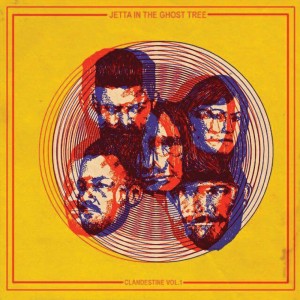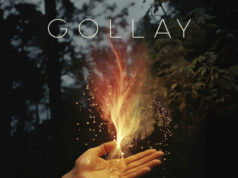Jetta in the Ghost Tree’s Clandestine, Vol. 1
It’s been almost nine years since former Flickerstick frontman Brandin Lea put out an album. You would never know it by listening to Clandestine, Vol. 1.
Recorded at AudioStyles in Colleyville with producer Taylor Tatsch and released by Dallas-based Idol Records, the debut platter from Lea’s newish songwriting vehicle, Jetta in the Ghost Tree, is overflowing with sumptuous, meaty hooks, vintage rock vibes, and lots of texture. And there’s a ton of solid riffage too.

One of the catchiest songs is the title track. A swirling polyphony of reverb-drenched guitar lines give way to Lea’s bright tenor. “Watch the sky roll backwards through a hole / In your childhood sanctuary / It’s all black and white you see.” Supporting the vocal melody are arpeggiated pickings and expansive, sustained guitar harmonies. The thick, high elements wash over the rhythm section like a DayGlo wave.
Another solid number is “Pontchartrain Eyes.” From a muted, minor-key piano intro, the song soars into a sweeping sonicscape of synths and sparse yet melodious guitars. The instrumentation is dense but airy, keeping the focus on Lea’s confessional lyrics.
After years of alcohol abuse, Lea has been clean and sober for nearly two years, and “Pontchartrain Eyes” is just one of a few references to his past and his recovery. Another is “The Belladonna Treatment,” referring to the 19th-century drug that was rumored to cure alcoholism. “I’ve been locked in a makeshift box,” Lea sings. “I’m six feet underground now / Every breath seems to suffocate / I’m running out of time now.” The song’s sinister feel is driven home by the oscillating bass lines, hard-hitting drums, and distorted, dissonant guitar noodlings. The long, narrative-driven strophes are interspersed with the refrain “Where’d you hide my belladonna?!”
The recording of Clandestine, Vol. 1 took 10 months, starting last February, which explains the attention to detail on each song. This is an album that rewards repeated listens. –– Edward Brown
James McMurtry’s Complicated Game
The late Fort Worth writer Jay Milner liked to tell how, during the 1970s, his tight-lipped friend Larry McMurtry once gave him a copy of his latest novel while at a party. Milner asked McMurtry to write something personal inside. McMurtry looked chagrined, trudged off to the porch, and sat for many long minutes with the book in his lap. Finally, he walked back inside and handed it back to Milner, who opened it. There was McMurtry’s signature and nothing more.
The Fort Worth-born and Austin-based James McMurtry doesn’t fall far from the tree. He’s not exactly a Chatty Cathy. But give him a guitar, and he’ll weave fictional tales of hardscrabble people just as well as his Pulitzer Prize-winning father. Ever since McMurtry released Too Long in the Wasteland (1989), he’s proven himself over and over again to be among the most linearly narrative voices exploring the human condition in song today. His new album, Complicated Game, shows McMurtry at the top of his game after a six-year absence from the recording studio. Few people have written as effectively or uncompromisingly as McMurtry when it comes to protest songs about war and politics. But he’s usually at his best when telling stories about regular people in all their depth, superficiality, disappointment, and glory. These songs are often little protests in themselves, such as “Copper Canteen”: “Don’t you be yelling at me when I’m cleaning my gun,” he sings. “I’ll wash the blood off the tailgate when deer season’s done / We got one more weekend to go / And I’d like to kill one more doe.”
There’s plenty going on in that passage beyond deer hunting. McMurtry consistently comes up with elegant but simple lines about life, and yet his best lyrics are often insinuated between breaths and left up to listeners to feel on their own. His trademark monotone vocal delivery works well in that regard, putting focus on the words and spaces. McMurtry does appear to be trying to sing more melodically than usual on a few of these songs, such as “She Loves Me.” But this is stark stuff overall. The album’s 12 songs are acoustic-guitar driven and stripped down, providing a folkie feel that recalls early John Prine classics such as “Sam Stone” and “Hello In There.” And that’s high praise.
The national reviews are glowing, with some heralding this as McMurtry’s best album. I wouldn’t go that far. Complicated Game is just one more in a long line of taut and compelling albums from a talented songwriter whose best works resemble novels in rhyme and who consistently makes Cowtown proud to claim him. –– Jeff Prince












